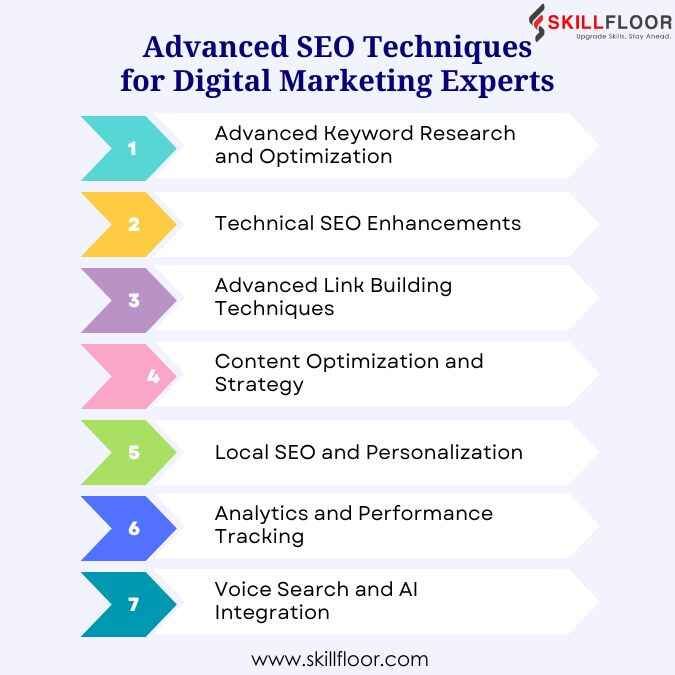Advanced SEO Techniques for Digital Marketing Experts
Discover advanced SEO techniques for digital marketing experts. Learn strategies and tips to boost search rankings and drive organic traffic.

staying ahead of search engine optimization (SEO) trends is crucial for Digital Marketing Experts. Beyond the basics of keyword research and on-page optimization, advanced SEO techniques can significantly enhance your online presence. One such technique is the implementation of schema markup. This structured data helps search engines understand your content better, leading to improved visibility in search results. Another effective strategy involves optimizing for voice search, a rapidly growing segment as more users rely on voice-activated devices. You can capture this expanding audience by tailoring your content to match conversational queries.
For Digital Marketing Experts aiming to deepen their SEO capabilities, focusing on content that aligns with user intent is essential. This means going beyond keyword stuffing and creating content that genuinely addresses user needs. Additionally, leveraging long-tail keywords can help attract more targeted traffic. Technical SEO is another critical area, encompassing site speed, mobile-friendliness, and secure connections (HTTPS). Ensuring your website is technically sound can enhance user experience and improve search engine rankings. By integrating these advanced SEO techniques, digital marketing professionals can optimize their strategies and achieve sustained success in the competitive online arena.
1. Advanced Keyword Research and Optimization
-
Long-tail Keywords and Semantic Search: As search engines become more sophisticated, they understand the context and intent behind queries. Incorporate long-tail keywords that reflect natural language usage and user intent. Tools like Google’s Keyword Planner and SEMrush can help identify these terms.
-
Topic Clusters: Rather than focusing on isolated keywords, build content around topic clusters. This involves creating a pillar page on a broad topic and linking it to several related subtopic pages. This approach enhances your site’s structure and improves relevance and authority for broader search queries.
2. Technical SEO Enhancements
-
Site Speed Optimization: Site speed is crucial for user experience and search engine rankings. Utilize tools like Google PageSpeed Insights and GTmetrix to analyze and improve load times. Optimize images, leverage browser caching, and minimize JavaScript and CSS files.
-
Mobile Optimization: With mobile searches surpassing desktop, ensuring your site is mobile-friendly is non-negotiable. Implement responsive design, prioritize mobile-first indexing, and conduct regular mobile usability testing to cater to this growing user base.
-
Structured Data and Schema Markup: Implementing structured data helps search engines better understand your content. Use schema markup to enhance how your pages appear in search results, leading to rich snippets, which can increase click-through rates. Google’s Structured Data Markup Helper can assist in adding schema to your site.
3. Advanced Link Building Techniques
-
Building Relationships for Backlinks: High-quality backlinks remain a cornerstone of SEO. Develop relationships with influencers, bloggers, and industry experts to earn authoritative backlinks. Guest blogging on reputable sites can also help build your backlink profile.
-
Content Syndication: Syndicate your content on high-traffic platforms like Medium, LinkedIn, and industry-specific forums. This extends your reach and can attract backlinks to your original content.
-
Digital PR: Leverage digital PR strategies to gain coverage in high-authority publications. Create compelling press releases, case studies, and newsworthy content that media outlets want to share.
4. Content Optimization and Strategy
-
Content Depth and Quality: Google values comprehensive and high-quality content. Create in-depth articles that provide valuable insights and solutions to your audience’s queries. Regularly update and expand existing content to keep it relevant and fresh.
-
Content Hub Creation: Develop content hubs or resource centers that organize all your content on a specific topic in one place. This approach boosts user engagement and signals to search engines that you are an authority on the subject.
-
User-Generated Content: Encourage user-generated content, such as reviews, testimonials, and community forums. This not only enriches your site with fresh content but also fosters user engagement and trust.
5. Local SEO and Personalization
-
Local Search Optimization: For businesses targeting local markets, optimizing for local search is crucial. Ensure your Google My Business listing is complete and accurate. Use local keywords and create content that resonates with your local audience.
-
Geotargeting and Personalization: Use geotargeting to tailor content and offers based on the user’s location. Personalization, such as customized recommendations and location-specific services, enhances user experience and can improve conversion rates.
6. Analytics and Performance Tracking
-
Advanced Analytics: Beyond basic metrics like traffic and rankings, delve into advanced analytics. Use Google Analytics and Search Console to track user behavior, engagement, and conversion paths. Tools like Hotjar can provide insights into user interactions through heatmaps and session recordings.
-
A/B Testing and Experimentation: Regularly test different elements of your site to understand what works best. A/B testing tools like Optimizely and Google Optimize allow you to experiment with different headlines, layouts, and calls to action to optimize performance.
-
Conversion Rate Optimization (CRO): Focus on improving your site’s conversion rate through CRO strategies. Analyze the user journey, identify bottlenecks, and make data-driven changes to enhance the overall user experience and drive more conversions.
7. Voice Search and AI Integration
-
Voice Search Optimization: With the rise of voice-activated assistants, optimizing for voice search is becoming increasingly important. Focus on natural language and question-based queries. Structure your content to provide concise and clear answers that can be picked up by voice search devices.
-
Artificial Intelligence and SEO: AI is transforming how we approach SEO. Use AI-powered tools like Clearscope for content optimization and MarketMuse for content strategy planning. These tools analyze vast amounts of data to provide insights into keyword relevance, content gaps, and competitive analysis.

What are rich snippets and how do they benefit SEO?
Rich snippets are a type of structured data markup that webmasters can add to their HTML to enhance the information displayed in search engine results. These snippets provide additional details directly in the search results, such as ratings, reviews, event dates, product prices, and other relevant information. By presenting this extra data, rich snippets help search engines understand the context of a webpage's content more accurately, resulting in more informative and visually appealing search listings.
The primary benefit of rich snippets is the significant improvement in click-through rates (CTR). When search listings are enhanced with rich snippets, they stand out more prominently in search results, making them more attractive to users. This increased visibility not only draws more attention but also conveys a sense of trust and credibility, as users can see valuable information at a glance. Consequently, websites with rich snippets often experience higher traffic and engagement, directly contributing to better overall SEO performance.
Advanced SEO requires a holistic approach that integrates technical expertise, creative content strategies, and a deep understanding of user behavior. By implementing these advanced techniques, digital marketing experts can enhance their site’s performance, achieve higher search engine rankings, and drive sustainable organic traffic. As the digital world continues to evolve, staying updated with the latest SEO trends and best practices is essential for long-term success.




























































